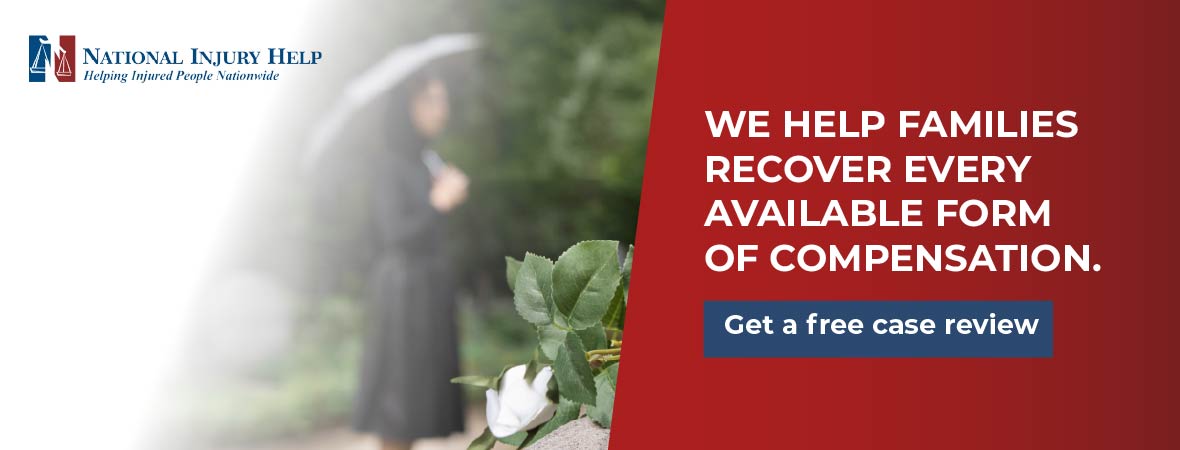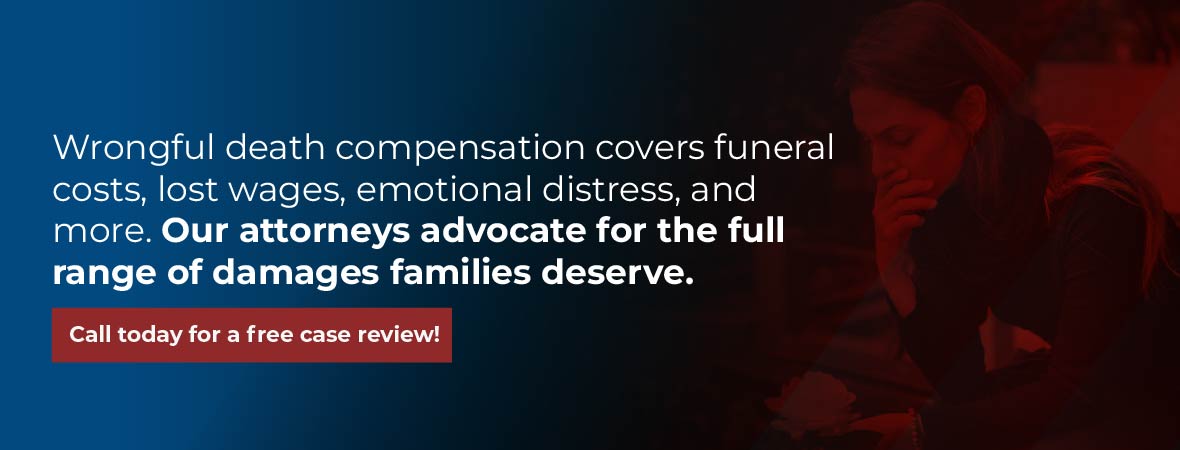When a loved one is lost due to someone else’s actions, certain family members may be entitled to financial compensation. This article explains the types of damages available in Arizona. If you are facing this kind of loss, contact National Injury Help. We are here to support your family and pursue justice on your behalf.
When a loved one dies because of someone else’s carelessness, negligence, or intentional action, the law provides a path for surviving family members to seek justice and financial recovery. This is known as a wrongful death claim. It is a civil lawsuit that focuses on accountability and recovery, not criminal punishment.
Wrongful death cases arise after fatal car crashes, medical mistakes, unsafe products, workplace hazards, and countless other situations where the loss could have been avoided. These tragedies leave families devastated, not just emotionally, but financially and practically as well. There are medical bills to handle, funeral arrangements to make, and an uncertain future ahead without the person who may have been the breadwinner, the caregiver, or the emotional anchor of the household.
Although no amount of money can bring back a loved one, wrongful death damages aim to help families regain stability. The law allows survivors to pursue compensation for loss in many forms, from lost income and household services to companionship, mentorship, and emotional support. This guide walks you through the types of compensation available in a wrongful death lawsuit, explains how courts calculate the amounts, and highlights why having legal guidance is so important.
Economic Damages
Economic damages cover the measurable financial impact of the death. These are often the easiest to prove because they are tied to documents like bills, pay stubs, and insurance records. However, families are often surprised by how far-reaching these losses can be.
Final Medical Expenses
When someone is seriously injured before they pass, there may be significant medical costs leading up to their death. These can include:
- Emergency room visits and trauma care
- Surgeries and diagnostic procedures
- Intensive care unit stays
- Medications and equipment
- Transportation by ambulance or helicopter
- Home health services, if provided before death
These medical bills often total tens or even hundreds of thousands of dollars. Families can claim reimbursement for all reasonable and necessary expenses that resulted from the injury or condition that caused the death.
Funeral and Burial Costs
Few families are emotionally or financially prepared for funeral costs. However, these expenses are immediate and often overwhelming. Wrongful death damages include:
- Preparation of the body
- Cremation or burial
- Cost of a casket or urn
- Funeral home service fees
- Transportation of the deceased
- Memorial services, flowers, and printed materials
These costs can be claimed with the help of invoices and receipts. Courts generally accept them unless they appear clearly excessive.
Lost Wages and Employment Benefits
If the person who died was employed or expected to work in the future, survivors may recover lost wages and benefits. This category can represent one of the largest components of a claim.
Attorneys use the following to calculate projected income:
- Pay stubs or W-2 forms to show current earnings
- Employment history showing raises and bonuses
- Career advancement potential
- An expert economist’s reports projecting earnings over a lifetime
Compensation can also cover lost benefits such as:
- Health insurance was previously provided to family members
- Retirement contributions like 401(k) or pensions
- Life insurance or performance bonuses, the person was expected to receive
- Loss of inheritance for children or other dependents
These losses are especially significant when the person who passed was the family’s primary provider.
Loss of Services
Beyond income, many people contribute essential unpaid labor to their families. The law recognizes this and allows compensation for loss of services such as:
- Childcare, including school pickups and bedtime routines
- Meal planning and grocery shopping
- Household chores, landscaping, or minor home repairs
- Managing finances, taxes, or legal documents
These services are often valued using market rates for professional replacements. For example, if a surviving spouse now has to hire a full-time babysitter or house cleaner, those costs can be included in the claim.
This component of economic and non-economic losses helps families understand the true scope of what has been taken from them, not just in dollars, but in daily support and routine care.
Non-Economic Damages
Non-economic damages focus on the emotional side of the loss. These types of compensation cannot be calculated from receipts or financial statements, but they are just as important. They recognize that human relationships were cut short.
Loss of Companionship and Consortium
Surviving spouses are entitled to recover damages for the emotional and relational loss they now face. This includes:
- Emotional support and shared decision-making
- Physical intimacy and affection
- Partnership in raising children or planning the future
Similarly, children can recover damages for the loss of parental guidance, love, and emotional nurturing. The law considers how close the relationship was and how deeply it has affected the survivor’s life.
To support this part of the claim, families may use:
- Photos and videos showing family traditions
- Letters, cards, or text messages that reflect emotional closeness
- Testimony from friends or relatives describing the bond
These details help jurors understand the depth of the relationship and the pain of its absence.
Emotional Pain and Suffering
Grief is not a minor inconvenience. It can cause real suffering that affects every part of a person’s life. Courts allow survivors to recover damages for emotional pain and suffering, including:
- Shock and trauma from the unexpected death
- Anxiety, depression, and sadness
- Difficulty working, parenting, or participating in daily life
- The need for therapy, medication, or grief counseling
Emotional distress is often documented through therapy records, medical treatment history, or testimony from family and friends who can describe changes in behavior, personality, or mental health.
Loss of Parental Care and Guidance
When a parent dies, their children lose more than financial support. They lose a role model, a mentor, and a source of emotional strength. This is especially devastating for younger children and teenagers.
Courts recognize this type of loss and award compensation for:
- Lost educational guidance and career mentorship
- Emotional support during important life events
- Reduced stability and structure in the home
This loss is difficult to value in dollars, but it has real and lasting consequences. Teachers, counselors, and other caregivers may provide testimony on how the child has changed since the loss.
Punitive Damages: When the Wrongdoing Was Especially Severe
In some wrongful death cases, the responsible party acted with extreme recklessness or even intentional harm. In those cases, the court may award punitive damages. These damages are not meant to compensate the family for a specific loss. Instead, they serve as punishment for the wrongdoer and as a warning to others.
Situations that may justify punitive damages include:
- A driver who was highly intoxicated caused a fatal crash
- A company that ignored repeated safety violations and caused a worker’s death
- A nursing home staff member who knowingly neglected a resident, leading to fatal injuries
To receive punitive damages, the plaintiff must show clear and convincing evidence of outrageous conduct. This is a higher legal standard than what is required for basic negligence. If proven, the jury may award a separate amount in addition to regular compensation for loss.
How Do Courts Calculate Damages?
Courts calculate economic and non-economic losses differently.
Economic Losses Are Based on Evidence
Calculating economic losses is often described as a science. Attorneys use detailed records and expert witnesses to determine the total impact. This can include:
- The age and life expectancy of the deceased
- Their occupation and likely career path
- Inflation and wage growth projections
- Actuarial estimates for retirement plans and insurance benefits
The more precise and well-supported the projections, the more likely the court is to award full compensation.
Non-Economic Losses Are Based on Storytelling
While economic losses rely on spreadsheets, non-economic losses depend on the story. Attorneys must humanize the person who died, show what made them special, and highlight how much their family has lost.
This often includes:
- Family albums and personal videos
- Character references from friends and neighbors
- Descriptions of birthday traditions, shared hobbies, or bedtime routines
- Professional evaluations from mental health providers
These details allow jurors to connect with the case on a personal level. They help the jury place a meaningful value on the parts of life that cannot be measured by a dollar sign.
Contact a Wrongful Death Lawyer Today
If someone you love died because of another person’s carelessness or wrongdoing, you do not have to face the legal process alone. The experienced attorneys at National Injury Help are here to guide you through every step of your case. We understand how to prove wrongful death damages, demonstrate compensation for loss, and make sure your family’s needs are fully addressed, both financially and emotionally.
Your consultation is free. You do not owe any legal fees unless we win your case.
Call us at 1 (800) 214-1010 today to speak with a compassionate legal team that will fight for your family’s future. Let us focus on the legal burden while you focus on healing.








